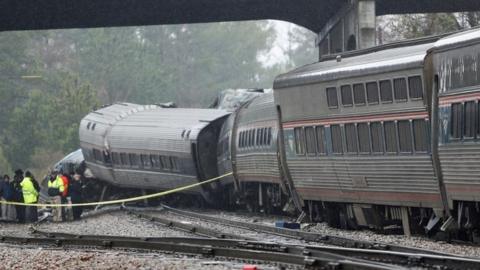
| Introduction to Train Crashes in the USA |
| Train accidents in the United States, though rare compared to other modes of transportation, often have devastating consequences. These events capture public attention, not just due to their severity but also because of the complex and often preventable nature of many train crashes. BBC News has consistently provided in-depth coverage of these incidents, highlighting the impacts on communities, infrastructure, and individuals. Let’s dive into the role of BBC News in covering train crashes in the USA, some notable incidents, and the ongoing efforts to improve train safety. |
| What Causes Train Crashes? |
| Train crashes can be caused by a variety of factors, including human error, mechanical failure, track issues, and even natural disasters. Human error is one of the most common causes, such as miscommunication between engineers, or improper signaling. Mechanical issues like brake failure or damaged railcars also contribute to accidents. Additionally, track malfunctions, such as damaged rails or obstructions, can lead to derailments. |
| Why Train Crashes Are Significant |
| When a train crash occurs, the consequences are often severe, involving significant damage to property, the environment, and, most tragically, loss of life. The size and weight of trains mean that crashes can result in large-scale derailments, fires, and hazardous material spills. The impacts extend beyond immediate physical damage, often affecting local economies, disrupting transport networks, and causing long-term trauma to survivors and their families. |
| BBC News Coverage of Train Crashes in the USA |
| BBC News has a dedicated role in reporting major incidents, including train crashes across the United States. They ensure the global audience stays informed on the latest developments while providing a thorough analysis of the causes and consequences of such accidents. |
| The Role of BBC News in Train Accident Reporting |
| BBC News’s primary goal is to provide comprehensive, unbiased, and timely reports about train crashes. Their role in disaster reporting goes beyond just sharing facts; they aim to paint a complete picture, explaining the broader implications of an accident. Their team of journalists and correspondents work tirelessly to give updates on rescue efforts, investigation findings, and recovery processes. |
| How BBC News Covers Train Crashes |
| BBC News covers train crashes in a variety of formats. They offer live coverage with real-time updates, bringing viewers and readers breaking news as it happens. They also produce investigative reports that delve into the causes of the crashes, including interviews with survivors, experts, and those involved in the investigation process. BBC News also provides extensive analysis of the systemic issues that may contribute to train accidents. |
| Real-Time Updates and Breaking News |
| When a major train crash happens, BBC News ensures the latest developments are shared through their website, TV broadcasts, and social media platforms. Their fast-paced coverage often includes details on the number of injuries, casualties, and the status of ongoing rescue efforts. These updates are crucial for keeping the public informed and alert. |
| Expert Insights and Analysis |
| In addition to breaking news, BBC News invites experts in transportation, engineering, and safety to offer insights into the causes of the crash and the measures that could be taken to prevent similar incidents. These analyses provide context that helps audiences understand the complexity of train safety and the intricacies of rail transport. |
| Notable Train Crashes Covered by BBC News |
| Over the years, BBC News has covered several high-profile https://www.caheadline.com/ in the United States, some of which have left lasting impacts on both local communities and national safety regulations. Here are some of the major incidents they have reported on. |
| The 1993 Mobile, Alabama Train Crash |
| In 1993, a collision between two freight trains in Mobile, Alabama, resulted in the derailment of one of the trains and a massive explosion. The blast killed several crew members and caused extensive damage to nearby buildings. BBC News covered the aftermath of the crash, including investigations into what caused the collision and how such accidents could be prevented. |
| The 2015 Philadelphia Train Derailment |
| On May 12, 2015, an Amtrak train derailed in Philadelphia, killing eight people and injuring over 200 others. BBC News provided live updates from the scene and followed the investigation, which revealed that the train was traveling at twice the speed limit at the time of the crash. This incident led to a nationwide conversation about train safety regulations and the need for increased investment in rail infrastructure. |
| The 2023 Ohio Train Derailment |
| The 2023 train derailment in Ohio involved a freight train carrying hazardous chemicals. When the train derailed, several cars caught fire, and dangerous chemicals leaked, leading to mass evacuations. BBC News covered the evacuation process, environmental concerns, and the ongoing investigation into the cause of the derailment. This crash renewed calls for better safety protocols and the regulation of hazardous materials transported by rail. |
| Impact of Train Crashes on US Communities |
| Train crashes do more than damage trains and tracks—they affect entire communities, leaving both immediate and long-term impacts. |
| Loss of Life and Injuries |
| The tragic loss of life is one of the most devastating impacts of a train crash. Survivors often face long-term injuries, both physical and emotional. In many instances, families are left without loved ones, and entire communities are shaken by the tragedy. |
| Economic and Environmental Damage |
| The economic impact of train crashes can be substantial. Derailments often disrupt the local economy, especially if they involve transportation of goods. Environmental damage can also be significant, especially if hazardous materials spill during the crash, contaminating air, water, and soil. |
| Recovery and Rehabilitation |
| After a major train crash, the recovery process can take months or even years. Communities may need to rebuild infrastructure, offer support to survivors, and assist in the cleanup of hazardous materials. The rehabilitation process is essential not only for physical recovery but also for the emotional and psychological healing of those affected. |
| BBC News’s Contribution to Raising Awareness |
| Beyond reporting on the latest train crashes, BBC News plays an important role in raising awareness about train safety and the need for better infrastructure. Their coverage often sparks important conversations about preventing future accidents and ensuring the safety of passengers and communities. |
| Public Safety and Advocacy for Better Rail Infrastructure |
| Through their investigative reports and expert interviews, BBC News advocates for improvements in rail infrastructure, including better signaling, updated train technology, and more robust safety regulations. By shining a spotlight on these issues, they encourage both the public and lawmakers to take action. |
| Investigating Causes and Preventative Measures |
| BBC News’s coverage often includes in-depth investigations into the causes of train accidents. These investigations provide insight into potential failings in safety protocols, offering suggestions for improvements in regulation and technology to prevent similar crashes in the future. |
| What Measures Are Being Taken to Prevent Future Train Crashes? |
| The U.S. has taken several steps in recent years to improve rail safety and reduce the likelihood of train crashes. |
| Improving Train Safety Technology |
| New technologies like Positive Train Control (PTC) are being implemented to prevent accidents caused by human error. This system automatically slows or stops a train if it’s traveling too fast, running a red signal, or heading into an unsafe area. |
| Strengthening Regulations and Infrastructure |
| Governments and rail companies are investing in stronger safety regulations and infrastructure upgrades. This includes better track maintenance, improved train design, and more frequent safety inspections. |
| Conclusion: The Importance of Timely News Coverage |
| Train crashes, though relatively rare, can have a profound impact on communities. Through timely and thorough reporting, BBC News helps keep the public informed about these tragic events. Their coverage not only tells the story of the accident but also advocates for better safety measures to protect people in the future. |





